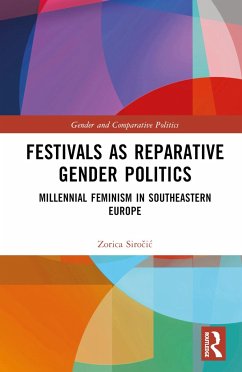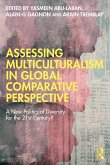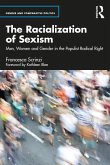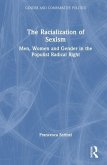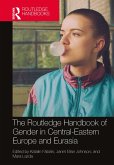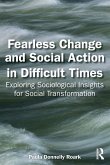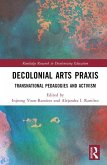What explains the popularity and widespread appeal of numerous post-Yugoslav feminist and LGBTQ+ festivals in the last decade? This book argues that the millennial generation expresses "reparative politics", as a distinct type of activism, through festivals.
Reparative political acting, as identified here, characteristically relies on playfulness and creativity, interpretative (gender) dissent, acceptance of organizational and programmatic messiness and hybridity, belonging, and positive affect. The reparative politics is vital in a context that is marked by an individual and collective trauma of heteropatriarchy, violent breakdown of the common state, and post-transitional economic precarity. The book uses excerpts from programs, interviews and observations collected through the multi-sited ethnographic research. Sirocic's focus on contemporary activism in Southeastern Europe challenges the narrow geopolitical understanding of the recent feminist politics and refutes the common assumptions of a passive millennial generation. Yet, the book's relevance surpasses its area of study, as it argues against the popular deriding of "artivist" expressions as the "merely cultural" or "merely aesthetic" engagement. In contrast, the book claims that such activities urge a redefined understanding of political agency.
Festivals as Reparative Politics demonstrates that contemporary feminist festivals represent a distinct reformulation of contentious politics of gender whose constitutive principles can be exemplary for other types of political engagements.
Reparative political acting, as identified here, characteristically relies on playfulness and creativity, interpretative (gender) dissent, acceptance of organizational and programmatic messiness and hybridity, belonging, and positive affect. The reparative politics is vital in a context that is marked by an individual and collective trauma of heteropatriarchy, violent breakdown of the common state, and post-transitional economic precarity. The book uses excerpts from programs, interviews and observations collected through the multi-sited ethnographic research. Sirocic's focus on contemporary activism in Southeastern Europe challenges the narrow geopolitical understanding of the recent feminist politics and refutes the common assumptions of a passive millennial generation. Yet, the book's relevance surpasses its area of study, as it argues against the popular deriding of "artivist" expressions as the "merely cultural" or "merely aesthetic" engagement. In contrast, the book claims that such activities urge a redefined understanding of political agency.
Festivals as Reparative Politics demonstrates that contemporary feminist festivals represent a distinct reformulation of contentious politics of gender whose constitutive principles can be exemplary for other types of political engagements.
Honorable Mention, 2024 Heldt Prize for Best Book in Slavic, East European, and Eurasian Women's and Gender Studies, The Association for Women in Slavic Studies (AWSS)
'Festivals as Reparative Politics offers a unique glimpse into the region that feverishly sought for an authentic - and, in several senses, reparative - outlet for a different political imagination. Zorica Sirocic provides an encompassing insight into how a generation of feminist and queer people coming of political age in a postsocialist, post-conflict and (post)transition contexts attempted to do politics differently, and why reflection and celebration were integral parts of it. The festivals are analyzed as the space where participants reclaimed a sense of individual and group agency, against their post-war heteropatriarchal cultures, often in a distinctly DIY (or DIO) way. Doing politics differently entailed experimenting, free expression and (self-)reflection on often messy and contradictory politics of gender. The festivals were created as safe spaces, spaces of play and joy, but also as a testing ground for horizontality, structurelessness, blurred boundaries, queer intimacies. The book shows us that they functioned as archives of emotions made public, archives of memories of joint struggles and places to reflect on our socio-political embeddedness. Combining intellectual generosity with a genuine openness towards the truly liberating aspects of the post-Yugoslav queer and feminist culture, Festivals as Reparative Politics manages to capture alternative ways of repairing the society torn by its war-led way to postsocialism.'
Adriana Zaharijevic, Institute for Philosophy and Social Theory, University of Belgrade, author of Judith Butler and Politics (2023)
'This book is about feminist festivals as safe spaces where one can belong, play and be creative, reflect and have fun and thus achieve reparation. It shows how these fascinating spaces existed in Southeastern European post-communist countries as early or even earlier than in the West. It allows us to peak into and learn from one of the most consolidated feminist arenas of the post-communist region. It teaches us about feminist responses and resilience in contexts where everyday reality is often hostile, misogynic or homophobic. A fascinating read.'
Andrea Krizsan, Professor in the Department of Public Policy and the Gender Studies Department, Central European University, Vienna, Austria
'Festivals as Reparative Politics offers a unique glimpse into the region that feverishly sought for an authentic - and, in several senses, reparative - outlet for a different political imagination. Zorica Sirocic provides an encompassing insight into how a generation of feminist and queer people coming of political age in a postsocialist, post-conflict and (post)transition contexts attempted to do politics differently, and why reflection and celebration were integral parts of it. The festivals are analyzed as the space where participants reclaimed a sense of individual and group agency, against their post-war heteropatriarchal cultures, often in a distinctly DIY (or DIO) way. Doing politics differently entailed experimenting, free expression and (self-)reflection on often messy and contradictory politics of gender. The festivals were created as safe spaces, spaces of play and joy, but also as a testing ground for horizontality, structurelessness, blurred boundaries, queer intimacies. The book shows us that they functioned as archives of emotions made public, archives of memories of joint struggles and places to reflect on our socio-political embeddedness. Combining intellectual generosity with a genuine openness towards the truly liberating aspects of the post-Yugoslav queer and feminist culture, Festivals as Reparative Politics manages to capture alternative ways of repairing the society torn by its war-led way to postsocialism.'
Adriana Zaharijevic, Institute for Philosophy and Social Theory, University of Belgrade, author of Judith Butler and Politics (2023)
'This book is about feminist festivals as safe spaces where one can belong, play and be creative, reflect and have fun and thus achieve reparation. It shows how these fascinating spaces existed in Southeastern European post-communist countries as early or even earlier than in the West. It allows us to peak into and learn from one of the most consolidated feminist arenas of the post-communist region. It teaches us about feminist responses and resilience in contexts where everyday reality is often hostile, misogynic or homophobic. A fascinating read.'
Andrea Krizsan, Professor in the Department of Public Policy and the Gender Studies Department, Central European University, Vienna, Austria

